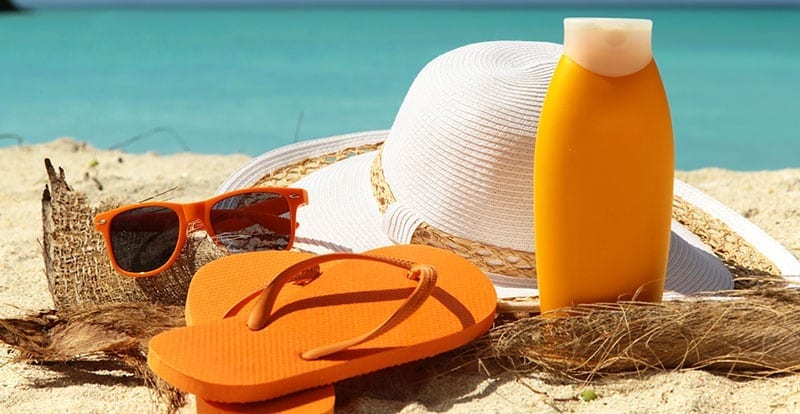Summer is here and everyone wants to have fun in the sun. An ounce of prevention is worth a pound of cure when you have diabetes. Taking care of your skin and overall well-being before you head outside makes the summer more enjoyable.
- Protect your skin. Certain medications used to treat diabetes can make your skin more sensitive to the sun including sulfonylurea’s (affect the pancreas) including glipizide and glyburide. People with diabetes are more susceptible to skin infections. Use a sunscreen with an SPF-30 for great protection. Apply what equals to a shot glass amount of sunscreen to your entire body. Make sure to put sunscreen on the top of your feet, ears, back of your neck and any balding spots on your head. Apply sunscreen a half hour before you go in the sun and reapply it if you go swimming even if considered water proof. Check the expiration date on your sunscreen. Try to purchase new sunscreen every year since it does lose its potency. Wear a hat and sunglasses when you’re in the sun as well as a lip balm with sunscreen. Consider buying summer clothing that contains a sunscreen factor in the fabric. Remember the sun can reach your skin in a car, especially if it has large windows or a sunroof.
- Often people with diabetes perspire heavily. Increased perspiration can lead to skin infections due to bacterial growth. Bathe daily to cleanse your skin. Pat dry thoroughly using a soft cotton towel. Apply moisturizer daily to keep your skin supple. Avoid the area between your toes where fungus can form. Use corn starch powder between the toes to keep them dry. Wear lightweight clothing made from natural materials. Clothes should fit loosely and be in light colors that won’t attract the heat of the sun. Avoid synthetic materials that can make you perspire more.
- Proper foot care is imperative during the summer months. Check your feet daily for signs of callouses, infection or irritation. Keep your feet clean, dry and covered at all times. If your feet get injured, show them to your doctor immediately. Never walk around barefoot and avoid flip-flops. Try to wear closed shoes or sandals at all times to protect your feet from sores and cuts. Wear pool shoes when you go into the water.
- Heat and perspiration can lead to dehydration. Whether you are exercising or just relaxing, always keep a water bottle with you during the summer. Drink plenty of water throughout the day. Avoid sugary juices and coconut water as well as coffee and alcoholic beverages. These beverages can make you more dehydrated. Regular water is always a safe choice. Think about Crystal Light if you enjoy flavored beverages. Know the symptoms of heat exhaustion such as muscle cramps, headaches and excessive perspiration. Other symptoms include dizziness and nausea, sudden coldness of your skin and rapid heartbeat. You may even stop perspiring completely. Drink water and get into an air conditioned room right away if you experience any of these symptoms.
- Choose healthy foods rather than sugary snacks that can make your blood sugar soar. Avoid barbecue sauces, fried foods and salty treats as well as fatty condiments such as mayonnaise. Stick to grilled chicken or fish and plenty of fruits and vegetables. Opt for lean meats, low-fat dairy and whole grains. Be prepared for picnics and barbecues by bringing along a couple of health-conscious choices so you know there will be something you can eat.
- Heat can affect your blood sugar levels and increase the absorption of certain types of insulin. Use a glucose meter to test your blood sugar often. Monitor the results and share them with your doctor. Talk to your doctor to see if you should make changes to your medication, drinking and eating habits in the heat. Never leave your glucose monitor, test strips, insulin pump or any other medications in the heat. Store them at the proper temperature at all times which is room temperature. Keep glucose tablets and a snack handy in case your blood sugar drops.
- Regular exercise is part of an effective diabetes self-management plan but you don’t want to get overheated. Workout in an air-conditioned space. If you exercise outdoors, do it early in the morning or later at night when the temperatures are cooler. You may even become dehydrated in the water midday without feeling the symptoms.
The heat can be detrimental when you are unprepared. Taking these precautions prevents emergencies and stressful situations when you have diabetes. If you know how to handle the heat, summer can be a great time of year.







Leave A Comment